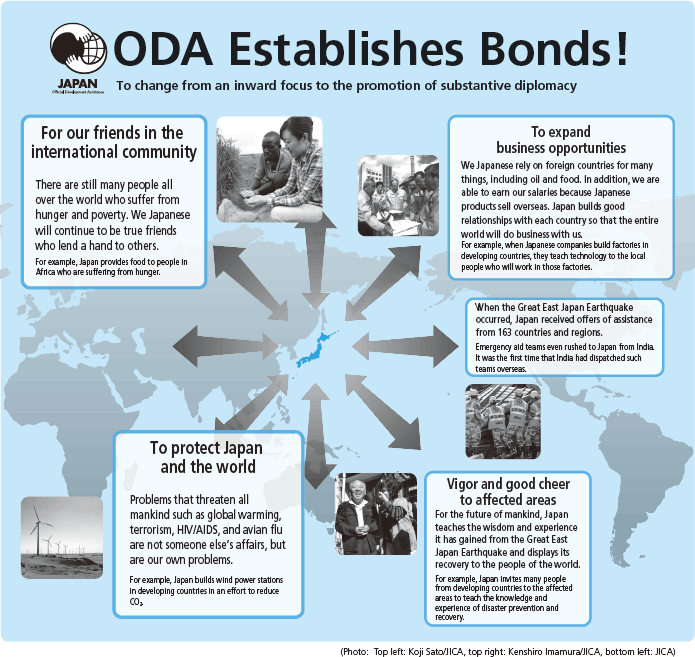Japan's Official Development Assistance White Paper 2011
Section 2 Giving Form to Our Responsibilities as a Member of the International Community
Japan must also proactively contribute to resolving the important impending issues that the international community is now facing. Specifically, Japan will continue to provide support for self-help efforts toward a stable transition and domestic reforms in the Middle East and North Africa, collaborate with international organizations for emergency/humanitarian aid in response to conflict/disasters, give seamless support for the peace-building process that takes into consideration the vulnerability of developing countries, and make other proactive contributions to the international community in the future as well.
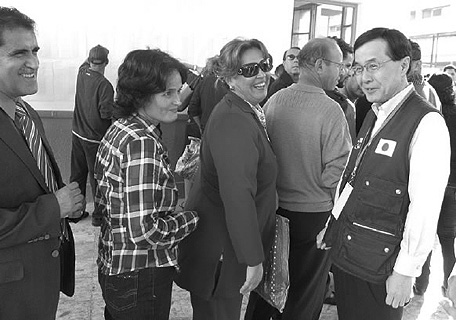
Parliamentary Vice-Minister for Foreign Affairs Kazuyuki Hamada observes Tunisia's first National Constituent Assembly election after the revolution
The Middle East and North Africa hold extremely important positions in guaranteeing the security of Japan’s energy. Those regions were already dealing with issues such as Middle East peace process, the Iranian nuclear problem, and measures to combat poverty and terrorism, and since December 2010, beginning in Tunisia, there have been large-scale protests by the citizens of countries and areas within the region. In particular, the enormous protests have brought down long-term governments in Egypt and Tunisia, opening the way for a democratic political process. In these and other ways, the Middle East and North Africa are heading into a truly historic period of transformation. However, reforms and transitions to new systems have only just begun in the countries of the Middle East and North Africa. With the brash demands of the masses, particularly young people, the governments must not only deal with "democratization of political systems," but must also overcome many economic and social problems (high unemployment, rising food prices, the widening gap between the rich and poor, etc.) in the future as well. For the countries in the region, the future will bring them a moment of truth. Achieving domestic reforms and transition to new systems in a stable manner is also extremely important for establishing peace and stability in this region and in ensuring human security. (See the figure on page 32) This will require a higher degree of assistance from the international community. From this standpoint, at the G8 Deauville Summit held in May 2011, the heads of state of each G8 country referred to the reform movements occurring in the region as the "Arab Spring," and have designated it as a top-priority world issue, reconfirming the need for assistance. Further, at the Summit, Prime Minister Kan announced that Japan also intended to cooperate with the international community to respond to the reform movements, and while taking into consideration Japan's experience in contributing to growth and stability in Asia, also utilize collaboration between the public and private sectors to proactively aid the self-help efforts of each country toward transitioning to new systems and implementing domestic reforms in the region in a stable manner. Prime Minister Kan indicated that Japan's policy would focus on the three pillars of (1) fair political process and government, (2) human resource development, and (3) job creation/fostering of industries, as well as (4) economic diplomacy including the promotion of trade and investment, and (5) forging people-to-people relations and dialogue. As a major member of the international community, Japan must steadily fulfill such promises to the international community in the future as well, and quickly give form to the aid and support described above.
As one of its efforts related to emergency humanitarian aid, Japan has proactively worked toward "human security" (the concept of integrating and enhancing people-centered efforts to protect people from a wide range of serious threats to human life, livelihood, and dignity, and to achieve the abundant potential of individuals) as one of the pillars of its foreign policy. In particular, prompt and effective humanitarian aid that meets the needs of the victims is of the utmost importance when a natural disaster occurs. To accomplish this, Japan expeditiously dispatches the Japan Disaster Relief Team (JDR) for lifesaving efforts, provide emergency relief goods, and give effective emergency aid in combination with support through international organizations.
For example, the earthquake that occurred in Christchurch, New Zealand in February 2011 caused enormous damage, and resulted in a large number of victims, including Japanese. Immediately following the earthquake, Japan also dispatched the JDR Search and Rescue Team and provided other assistance to conduct diligent search and rescue efforts.
In addition, dispatch of the JDR Medical Team and Self-Defense Force unit to assist after the earthquake in Haiti and flood in Pakistan, and other contributions that Japan has made in the past, have garnered high praise in each country.
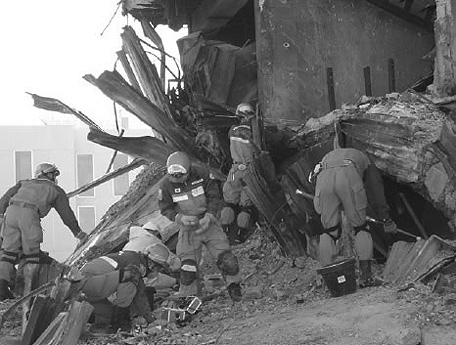
The Japan Disaster Relief Rescue Team conducts a search in New Zealand (Photo: JICA)
Further, for refugees and internally displaced people resulting from conflict and other problems in vulnerable countries in Africa and other regions, children who have lost their parents and are hurt, and people who are facing serious food shortages, etc., Japan strives not only to provide emergency aid but also to seamlessly implement support for quick recovery and provide development assistance toward establishing medium and long-term stability and development in society, and to prevent the recurrence of circumstances that require humanitarian aid.
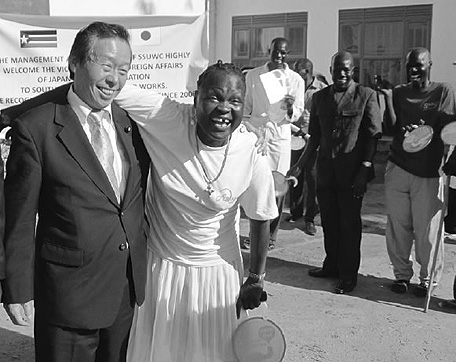
Parliamentary Senior Vice-Minister for Foreign Affairs Ryuji Yamane inspects the site of "The Project for Management Capacity Enhancement of Southern Sudan Urban Water Corporation" that Japan is conducting in South Sudan
Moreover, international cooperation to prevent disasters is vital to the reduction of damage due to the disasters that occur frequently around the world. Japan will strengthen international cooperation in this area by hosting international conferences and seminars, etc., to share the lessons that have been learned from the Great East Japan Earthquake with the international community, and further advance efforts to prevent disasters.
Japan will renew its awareness that humanitarian aid is not a one-way street, but is conducted through mutual assistance, and while using Japan's capabilities, engage proactively in emergency humanitarian aid in the future as well.
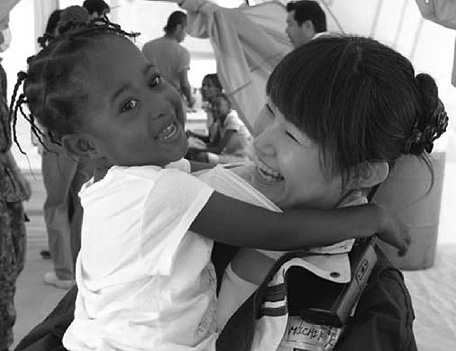
A Japanese relief team member and a girl smiling after receiving treatment following the Haitian earthquake (Photo: JICA)
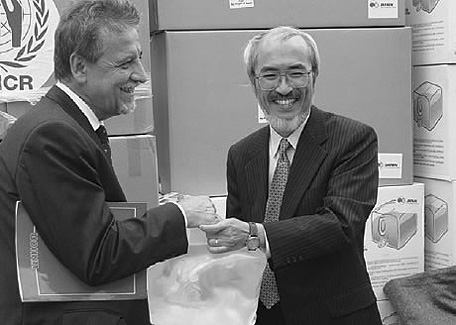
Japan provided emergency relief goods through UNHCR to aid the victims of drought in the Horn of Africa region. Here, the Chief Representative of JICA Kenya office delivers polyethylene tanks to UNHCR. (Photo: JICA)
